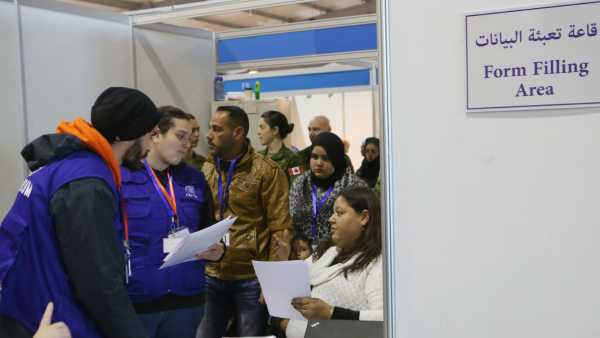Proposed Delaware legislation requires notification of refugee resettlement

Canada has announced that it will take around 25
Republican legislators introduced a bill requiring the notification of any refugee entering the state from Iran, Sudan and Syria.
House Bill 299, introduced by State Rep. Deborah Hudson, R-Fairthorne, and State Sen. Colin Bonini, R-Dover, would require the Secretary of Health and Social Services to notify the governor and Secretary of Homeland Security of any refugee resettled in Delaware if in the past five years they lived in countries the U.S. deems as “providing support for acts of international terrorism.” Those countries currently are Iran, Sudan and Syria.
Hudson said she’s not against resettlement if the situation is handled appropriately. But she said she’s concerned the process in the U.S. is not secure enough and that terrorists may pose as refugees as a way to get into the country.
“The terrorists in these countries are very crafty and I wouldn’t put it past them to clean their background to come into a nice state like Delaware,” Hudson said.
“Personal security, family security, in Delaware is the most important thing we have—so I want public safety and the governor to be aware of who the people are with a background check and whatever they can do.”
Thousands of Syrians have fled their country, often risking their own lives, to escape the bloodshed caused by ISIS and their leader Bashar al-Assad, who has allegedly killed his own people.
Many other small countries in Europe have agreed to accept refugees, but in the United States political leaders have argued whether the nation should accept them.
Several governors have said they won’t allow Syrians to enter their state—following fears that the recent terrorist attacks in Paris may have been conducted by individuals who entered as Syrian refugees.
Gov. Jack Markell, D-Delaware, on the other hand, said it’s the state’s humanitarian duty to accept refugees who are fleeing ISIS, political dictators or religious repression.
Hudson’s legislation is not the first conservative reaction to Markell’s statements—in December a Delaware coalition was formed to oppose any Syrian refugee entering the state.
Hudson said her legislation is a statement to the Governor that if he will allow refugees in Delaware, the process should be taken seriously.
Hudson said she also expects costs to rise as refugees are accepted into the state, and would like more transparency about expenses as well.
The governor’s spokesman, Jonathan Dworkin, reiterated his support of President Barack Obama’s efforts to provide asylum for refugees in the U.S. stating, “[Markell] recognizes that many of the people we are talking about are fleeing the perpetrators of terror, and he believes it goes against our values to single out those escaping oppression as this bill would do.”
He added the federal refugee review system has the “highest level of security checks of any traveler to American shores, including biometric and biographic checks and in-person overseas interviews by federal officials trained to ensure the applicant is a bona fide refugee and not a security risk.”
The refugee resettlement program started in 1980 as a partnership between state government and non-profit resettlement agencies to provide temporary cash and medical and social services until refugees could become self-sufficient.
The Refugee Resettlement Program in Delaware, which is administered under DHSS’ Division of Social Services, reported that during federal fiscal year 2015 the current refugee social service vendor in Delaware provided services to 65 refugees and maintained a monthly active caseload of about 42 clients.
DHSS would not comment on the legislation, but spokeswoman Jill Fredel said the proposal is being reviewed and has asked legal counsel in the attorney general’s office to look at it as well.
The legislation resembles much of the rhetoric on the campaign trail that has produced fear and discriminatory policies, said Jamal Abdi of the NIAC Action—the sister organization of the National Iranian American Council that works to strengthen the Iranian-American community.
Republican presidential candidate Donald Trump said he would not allow Muslims to enter the country, and republican presidential candidate Ted Cruz has proposed monitoring Muslim neighborhoods in the U.S.
“These are people fleeing the violence of ISIS, and fleeing political repression or religious repression, and to close our doors to them has no rhyme or reason to it, it’s purely reactionary,” Abdi said.
He also said he believes the legislation would weaken relations between the Iranian and American people, and that it would not provide the safety Hudson and Bonini believe it would.
“The San Bernardino attack was perpetuated by an American citizen and Pakistani citizen who traveled through Saudi Arabia,” Abdi said.
“And one of the victims was an Iranian refugee who fled Iran in the 80’s who was Christian. This bill would have restricted that woman from coming here and would have done nothing to stop that attack.”
Jacob Bender, executive director for the Philadelphia chapter of the Council on American-Islamic Relations, added that 15 of the 19 hijackers on September 11th were from Saudi Arabia—and thousands of Saudi students enter the U.S. every year to receive a university degree.
Bender is an American Jew whose relatives were killed during the holocaust. He said he works to protect the Muslim community because he believes it is everyone’s responsibility to oppose prejudice and hate wherever they see it—even if it’s not in their own community.
He said even if the legislation is a genuine attempt to protect Delawareans; it still puts refugees and others from the Middle East in danger.
“Their proposal still has the impact of creating a wall or barrier—some people would like to create real walls around the United States—but let’s say it only creates a metaphorical barrier between Muslims and the rest of the American people, it’s still a recipe for increased prejudice, hate crimes, misunderstanding, and therefore should not be supported.”
Hudson argues it is the state’s responsibility to ensure transparency and protect the public.
“All I’m doing is trying to do what other countries are doing, the Middle Eastern countries and other states in the U.S.,” she said. “States have a responsibility to do their part—before we give the families money, full services, a place to live, let’s find out if there’s anything in their background that’s suspect.”
WHYY is your source for fact-based, in-depth journalism and information. As a nonprofit organization, we rely on financial support from readers like you. Please give today.





